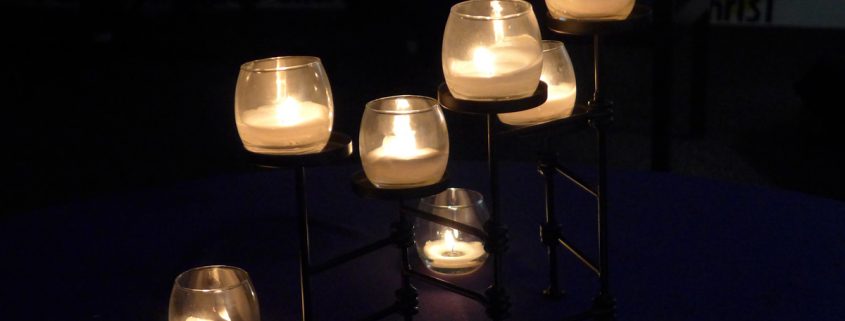Hope is inhabiting our longing
(Isaiah 64:1-9) By Rev. Rick King—The reading from Isaiah for this first Sunday of Advent does not have the tone we’re accustomed to, busy as we are with all there is to do in this season I call, “Hallowthankmas,” which runs roughly from Halloween, through Thanksgiving and on past Christmas, and stops sometime shortly after the New Year. There’s a lot in us that wants to look forward immediately to Christmas, accustomed as we are to constant stimulation. We’re used to the traditions that propel us from one holiday to the next in a season when there’s limited light, and it’s too cold most of the time to get anything done outside. Maybe we want to keep our Seasonal Affective Disorder at bay, or perhaps we associate the holidays with our families and the interpersonal struggles that come with being part of them.
This time of year, we may fall into using the season’s purposeful busyness and noisy cheer to fill the empty spaces we may feel, whether we’re single or married, solitary or with more people in our life than we can ever spend quality time with. Because the season is supposed to be bustling, busy, and full of life and good cheer.
Well, the Isaiah reading speaks to our situation, as it did to Israel’s. It’s different than many of the other Isaiah passages we read during Advent and Christmas. We’re more familiar with words like those in chapter 40, for example, which we know from Handel’s “Messiah”: “Comfort, comfort ye my people.” But our reading today is a prayer uttered to God out of pain and deep despair. And given what’s happening in our nation and the world this year, Isaiah’s words this morning seem particularly relevant because God seems absent, and silent. Like Israel, we would like God to return to a time when God acted in unmistakable ways—when God acted like GOD! Mountains quaking, and fire, so much so that all their enemies, the nations that wanted to take them out, would tremble.
But Israel had entered into a different period in its relationship with God, a time not just of silence, as though God were hiding. No, God’s relationship with people was evolving, becoming less overtly supernatural. The Hebrew Scriptures go from stories like the Burning Bush and the parting of the Red Sea, to God speaking to Elijah in a still, small voice, rather than in earthquake, wind, and fire. God was a lot more subtle now, and Israel’s prophets were there to remind people that God was still at work, just not in parting seas, but now instead in parting nations and families from one another in the form of military conquests and the Babylonian Exile. Prophets were there to tell them that God was working through historical events.
In this season we’re entering, this season of waiting, of preparation, of expectancy, of supposed HOPE—where do we look for hope? In a time when the people Jesus and the prophets said are dearest to God’s heart are being thrown under the bus by our own government, and the poor, women, children, immigrants and minorities are being trampled underfoot, how can we have hope? Doesn’t any message of hope, even during this season, ring hollow in the face of what’s happening?
But as the apostle Paul is so good to remind us in Romans 8:24, “Hope that is seen is not hope, for who hopes for what is seen?” The very essence of hope is that we have to look for it, reveal and call attention to what points to it, and yes, even LONG for it. This Advent, in this time and place, you and I can find, as Israel did, that longing for God in hope is itself part of God’s presence, part of how we know God is there. IF we learn to live in the times when God seems most absent, and silent, and to practice perseverance in our longing and our hope. We need to learn to inhabit our longing. For it is our longing that makes us reach out, thirsting, hungering for a deeper relationship than just “what God can do for me.” And all of a sudden, it also makes it impossible to spiritualize the message of the readings, impossible to individualize it. This is a longing for the salvation of all, not just an individual!
In Advent, we have an opportunity to intentionally focus on what it is we’re missing in our spiritual life, to reach out to God and to remove barriers to a deeper, more resilient, more indestructible relationship with God—to sharpen our prayers, and embolden our social action. In Advent, we get ready for a God who moved from Burning Bush, to sheer silence, to being the voice of prophets, to a face-to-face presence in Jesus. We celebrate a God who will stop at nothing to get through to us, who is not only there waiting for us, but deeply desires a relationship with us, who longs for the truth and reconciliation so badly needed in our world right now—and who promises to transform us through a love that will not let us go.
This is how we LIVE HOPE, in preparation for the coming of Jesus. Let’s not be afraid of God’s seeming absence. But on the other hand, if we feel God’s presence in all the Advent traditions and preparations for Christmas, so be it—let’s give thanks for it, and have it power our action on behalf of hope!
If you feel God absent, in the form of a longing, I invite you to welcome it; listen in the silence for what your heart might be telling you. And give thanks for that longing, because it drives us all to reach out to God even more, and to become part of the transforming work of Jesus in our world. Amen.


